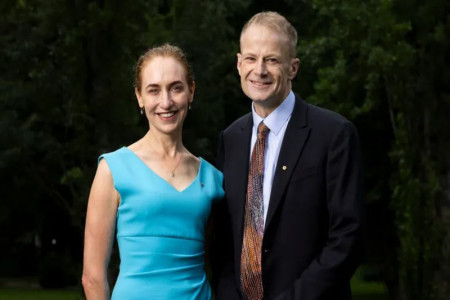The esteemed pathologist's experimental therapy is based on his own pioneering research on melanoma.
Professor Scolyer's subtype of glioblastoma is so aggressive most patients survive less than a year.
But on Tuesday the 57-year-old announced his latest MRI scan had again showed no recurrence of the tumour.
"I couldn't be happier!!!!!" he wrote in an update on social media.
Prof Scolyer is an internationally renowned pathologist, and was this year named Australian of the Year alongside his colleague and friend Georgina Long, in recognition of their life-changing work on melanoma.
Co-directors of the Melanoma Institute Australia, over the past decade their research on immunotherapy, which uses the body's immune system to attack cancer cells, has dramatically improved outcomes for advanced melanoma patients globally. Half are now essentially cured, up from less than 10%.
It's that research that Professor Long, alongside a team of doctors, is using to treat Prof Scolyer - in the hope of finding a cure for his cancer too.
In melanoma, Prof Long and her team discovered that immunotherapy works better when a combination of drugs is used, and when they are administered before any surgery to remove a tumour. And so, Prof Scolyer last year became the first brain cancer patient to ever have combination, pre-surgery immunotherapy.
He is also the first to be administered a vaccine personalised to his tumour's characteristics, which boosts the cancer-detecting powers of the drugs.
The results so far have generated huge excitement - and optimism that the duo may be on the cusp of a discovery which could help the roughly 300,000 people diagnosed with brain cancer globally each year.
Roger Stupp - the doctor after whom the current protocol for treating glioblastomas is named - earlier this year told the BBC Prof Scolyer's prognosis was "grim", and that it was too early to tell if the treatment is working.
He added that while Mr Scolyer's earlier results were "encouraging" he wanted to see him reach 12 months, even 18, without recurrence before getting excited.
Prof Scolyer and Prof Long have previously said the odds of Prof Scolyer being cured are "miniscule", but they hope the experimental treatment will prolong his life and translate into clinical trials for glioblastoma patients.
By Tiffanie Turnbull,BBC News, Sydney


